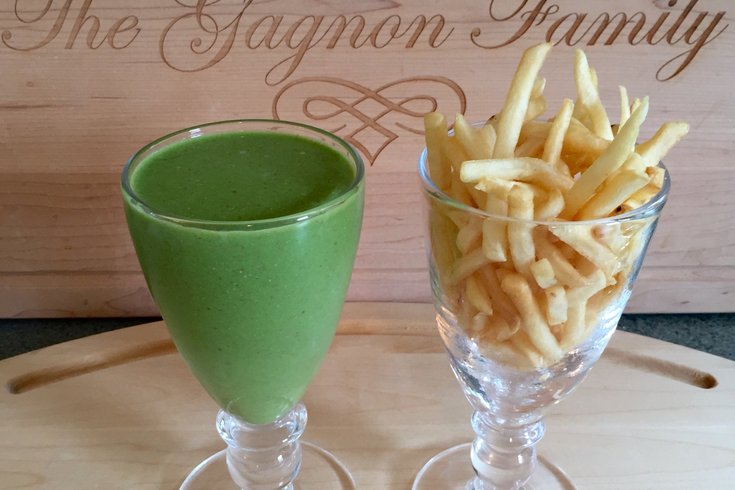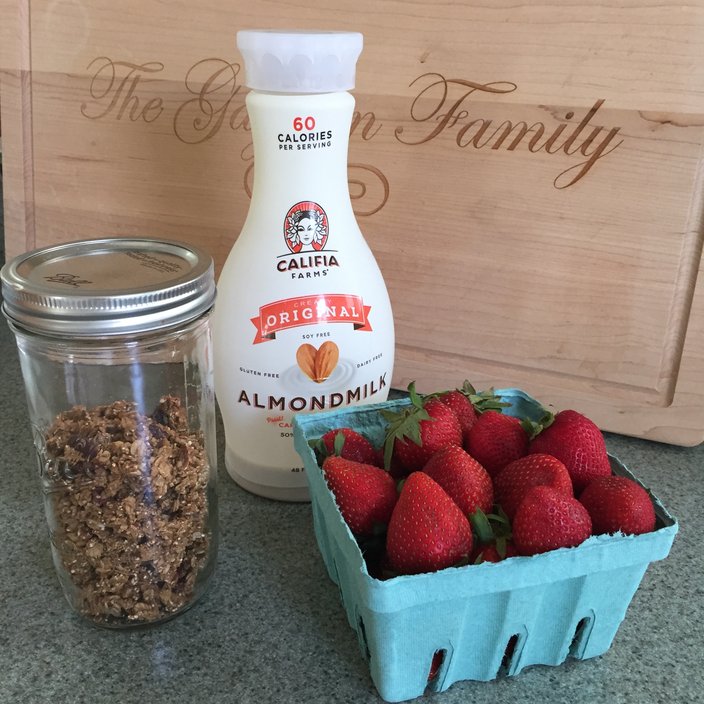
May 04, 2016
 Katie Gagnon/for PhillyVoice
Katie Gagnon/for PhillyVoice
Katie has sought balance between the important nutrition her baby needs and her unhealthy pregnancy cravings. She has a spinach and pineapple smoothie every morning and occasionally indulges in french fries.
After learning I was pregnant, I became obsessed with pregnancy nutrition. I already knew some basics like no alcohol or raw fish, but I didn’t really understand what “eating for two” required.
"What to Expect When You’re Expecting," by Heidi Murkoff and Sharon Mazel, was my first source of information. It details what you should be eating, and how much, daily: 300 additional calories and three servings of protein, four servings of calcium, three servings of vitamin C, three to four servings of leafy green/yellow fruits/veggies, six-plus servings of whole grains, plus some iron-rich and high-fat foods.
At first, I kept a food journal to ensure I was meeting those requirements every day. Though chronicling every bite was unsustainable, it quickly showed me the gaps in my diet. Mostly, I was lacking in calcium, vitamin C and whole grains.
I am serious about what I eat and drink because there are two beating hearts in my body.
So I started having Kashi cereal or granola with strawberries or blueberries and organic skim milk for breakfast. I was told 200 milligrams of caffeine each day is safe but switched to decaf coffee with almond milk instead. Mid-morning after I work out, I have a smoothie. I blend coconut water, spinach, Greek yogurt, frozen pineapple, raw oats and flaxseeds. It looks scary green but it tastes like a piña colada, and I hit a good amount of my daily requirements by drinking it, which makes me feel great, especially if I find myself elbows deep in supersize fries.
For the remainder of the day, I try to fill out my requirements. Some foods pack a double punch. Pasteurized cheese gives me protein and calcium; red meat gives me protein and iron; peanut butter gives me protein and is delicious. I snack on fresh fruit and veggies throughout the day, and I usually have a big green salad with protein and whole grains for lunch or dinner.
Granola, fresh berries and almond milk provide whole grains, vitamin C, fiber and calcium in Katie's pregnancy diet.
There are a few do’s and don’ts in my new diet: I drink at least 72 ounces of water daily, and I don’t drink soda, except for an occasional Shirley Temple or ginger ale. I buy cage-free organic eggs, pasture-raised meat with no hormones or antibiotics and organic produce. I buy only wild-caught fish like salmon and shrimp, and I don’t eat large fish that can contain higher levels of mercury like swordfish. If I want a sandwich, my lunchmeat has to be heated up to avoid the risk of bacteria. I make sure my dairy and juices are pasteurized and my eggs aren’t runny. As I’ve advanced in my pregnancy, it’s easier to remember all of the do’s and don’ts, but it is definitely a little overwhelming, and I have certainly made some mistakes, especially when I’m eating out and not in control of the ingredients.
Pregnancy nutrition should be tailored to the individual. Some women have dietary restrictions or allergies; some women are vegetarian or vegan. Every woman is different, so it’s best to talk to your doctor to ensure your diet is right for you and your baby.
I am serious about what I eat and drink because there are two beating hearts in my body. I am comforted to know that any gaps in my nutrition are being filled in by my nightly prenatal vitamin. I keep in mind that perfection is unattainable, and french fries are delicious, and that “eating for two” really means 300 extra healthy calories a day.
 Katie Gagnon/for PhillyVoice
Katie Gagnon/for PhillyVoice